Our National Parks, Past and Present: A Conversation
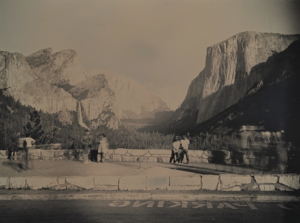
December 2, 2024, 6:00 – 7:00PM PST
- Rep. Judy Chu, who has long worked on the San Gabriel Mountains designation
- Kimberly Morales Johnson (Gabrieleno/Tongva), Tribal Secretary of the San Gabriel Band of Mission Indians
- Megan Kate Nelson, historian and author of Saving Yellowstone: Exploration and Preservation in Reconstruction America
Reckoning with the West
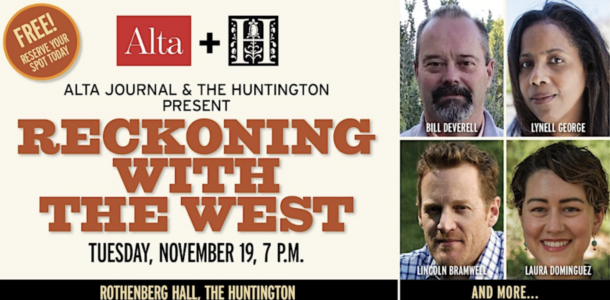
November 19, 2024, 7:00 – 8:00PM PST
Alta Journal and the Huntington celebrated Alta Journal’s Issue 29: Reckoning with the West with a special evening of conversation with William Deverell, founding director of the Huntington-USC Institute on California and the West, writers Lynell George, Lincoln Bramwell, and Laura Dominguez, musician Moises Vazquez, and more.
The Score: Histories of the Stadium
November 12, 2024, 12:00 – 1:00PM PST
ICW hosts a conversation featuring Frank Guridy and Priscilla Leiva, discussing the interplay between sports history, urban development, and race relations.
-
Frank Andre Guridy is the Dr. Kenneth and Kareitha Forde Professor of African American and African Diaspora Studies. He is also Professor of History and the Executive Director of the Eric H. Holder Initiative for Civil and Political Rights at Columbia. He is an award-winning historian whose recent research has focused on sport history, urban history, and the history of American social movements. The Stadium: An American History of Politics, Protest, and Play (Basic Books, 2024) is his third book.
-
Priscilla Leiva is an Assistant Professor of Chicana/o and Latina/o Studies at Loyola Marymount University. She received her Ph.D. in American Studies and Ethnicity from the University of Southern California in 2014 and holds a B.A. in American Studies from Yale University. Her research interests include relational ethnic studies, urban history and sports history, particularly as it relates to place making and community formation. She is currently working on a book manuscript that examines how stadiums have produced and sustained racial meanings that shape ideas about the city and belonging. She is also the lead researcher for Chavez Ravine: An Unfinished Story, an oral history and archival collaboration that documents a long history of displacement and its aftermath in Los Angeles.
From Desire and Extinction in the Illicit Succulent Trade to Socioecological Harm Reduction
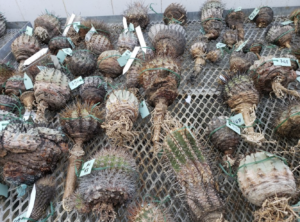
October 31, 2024, 12:00 – 1:00PM PST
Cactus and succulent plants are a global phenomenon with unrivaled botanical popularity. Despite their iconic status, they are also some of the world’s most threatened species. Perhaps strangest of all—at least to the uninitiated—it is cactus and succulent collectors who many conservationists blame for threatening succulent species with extinction. Join ICW and Huntington Library, Art Museum, and Botanical Gardens for this talk featuring Dr. Jared Margulies from University of Alabama. Drawing on insights from his book, The Cactus Hunters: Desire and Extinction in the Illicit Succulent Trade, Dr. Margulies will consider how and why some of the most passionate lovers of these plants engage in this illicit trade and what underpins demand through an analysis of desire.
-
Jared Margulies is an Assistant Professor in the Department of Geography and the Environment at the University of Alabama where he leads the Critical Conservation Geography Collective. The Cactus Hunters was published in 2023 by the University of Minnesota Press and received Honorable Mention for the 2023 AAG Globe Book Award for Public Understanding of Geography as well an Honorable Mention for Outstanding Book Award from the Cultural and Political Ecology Specialty Group of the American Association of Geographers. His work is published in outlets such as Geopolitics, Conservation Biology, Environmental Humanties, Political Geography, and Geoforum, and World Development. He currently serves as a handling editor and on the editorial boards of Conservation Biology and Conservation and Society.
Special Exhibition: “Where You Stand: Chinatown 1880 to 1939” – Union Station Installation in Partnership with Metro Art
October 2023 – October 2024, Union Station
In collaboration with historian Greg Hise and friends at the Chinese Historical Society of Southern California, The Huntington, and USC Cinema, the Chinatown History Project blends historical research with creative website and augmented reality experiences to recover the neighborhood of the original Chinatown of Los Angeles.
In the mid-1930s, the city’s first Chinatown, a vibrant, polyglot neighborhood of several thousand people, was razed to make way for Union Station, the last major metropolitan train station constructed in the United States. From a foundational database research project designed to repopulate this place with the lives of the people who lived and worked there, the project expands outward by inviting audiences and end users to see within and across layers of Southern California space and history. Where You Stand: Chinatown 1880 to 1939 invites participants into the center of the vibrant community through a multi-dimensional experience.
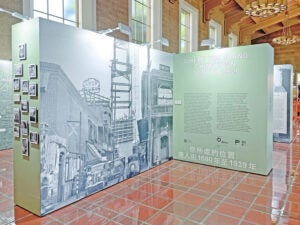 Access the prototype of the augmented reality and details from the exhibit here.
Access the prototype of the augmented reality and details from the exhibit here.
Compton in My Soul: A conversation with Albert Camarillo
October 14, 2024, 12:00 – 1:00pm PST
Compton in My Soul: A conversation with Albert Camarillo
ICW spends an afternoon with Albert Camarillo, speaking about his new book, Compton in My Soul. Joining in on the conversation will be Bill Deverell, Kelly Lytle Hernandez, and George Sanchez.
-
Al Camarillo is Professor of American History and the Leon Sloss Jr. Memorial Professor/Haas Centennial Professor of Public Service, Emeritus at Stanford University. A member of the Stanford University History Department for over forty years, Camarillo is widely regarded as one of the founding scholars of the field of Mexican American history and Chicano Studies. He was born and raised in Compton where he attended public schools before entering the University of California at Los Angeles. He received his BA in History in 1970 and his Ph.D. in U.S. History in 1975. He is the first Mexican American in the nation’s history to receive a Ph.D. in U.S. history with a specialization in Chicano History.
-
Kelly Lytle Hernández holds The Thomas E. Lifka Endowed Chair in History at UCLA. One of the nation’s leading experts on race, immigration, and mass incarceration, she is the author of the award-winning books Migra! A History of the U.S. Border Patrol (University of California Press, 2010), City of Inmates: Conquest, Rebellion, and the Rise of Human Caging in Los Angeles (University of North Carolina Press, 2017), and Bad Mexicans: Race, Empire, and Revolution in the Borderlands (Norton, 2022). She also leads the Million Dollar Hoods research initiative, which maps fiscal and human cost of mass incarceration in Los Angeles. For her historical and contemporary work, Professor Lytle Hernández was named a 2019 MacArthur “Genius” Fellow. She is also an elected member of the Society of American Historians, the American Academy of Arts and Sciences, and the Pulitzer Prizes Board.
-
George J. Sánchez is Professor of American Studies & Ethnicity, and History at the University of Southern California, where he also serves as Director of the Center for Diversity and Democracy and as chair of the Department of American Studies & Ethnicity. In addition, Professor Sanchez is director of USC’s Mellon Mays Undergraduate Fellows program and runs the university’s major in Contemporary Latino and Latin American Studies. He is the author of Boyle Heights: How A Los Angeles Neighborhood Became the Future of American Democracy (Univ. of California Press, 2021), Becoming Mexican American: Ethnicity, Culture and Identity in Chicano Los Angeles, 1900-1945 (Oxford University Press, 1993), and co-editor of three other books. He received his B.A. in History and Sociology from Harvard University in 1981 and his Ph.D. in History in 1989 from Stanford University. He was born in Boyle Heights to two immigrant parents from Mexico and was a first generation college student.
Twelve Trees: A Conversation with Huntington Curator Daniel Lewis & University of Aberdeen Professor Alan Marcus
September 24, 2024, 12:00 – 1:00pm PST
Twelve Trees: A Conversation with Huntington Curator Daniel Lewis & University of Aberdeen Professor Alan Marcus
This ICW webinar brings together Dan Lewis and Alan Marcus, as the two discuss the Dr. Lewis’ recent book, Twelve Trees: The Deep Roots of Our Future.
-
Dan Lewis is the Dibner Senior Curator for the History of Science & Technology at the Huntington Library. He is a writer and an environmental historian. His permanent exhibition Beautiful Science: Ideas that Changed the World was named as the best exhibition in America by the American Association of Museums the year after it opened. His most recent book, Twelve Trees: The Deep Roots of Our Future explores the relationship between human and nature and our interconnected future.
-
Alan Marcus is Professor in Creative and Cultural Practice at the University of Aberdeen in Scotland. As a filmmaker and cultural historian, he often explores themes associated with the impact of mass tourism and urbanization on iconic post-traumatic sites. Works include films on the US/Mexican border controversy, the environmental impact of over-development in Waikiki, and a current project on the effects of climate change on a Canadian Inuit community on the Arctic Ocean.
Arid: A Conversation with Natalie Koch
September 17, 2024, 12:00 – 1:00pm PST
Arid: A Conversation with Natalie Koch, joined by Bandar Alsaeed, Bill Deverell, and Ciruce Movahedi-Lankarani
Join ICW for this conversation with Natalie Koch, discussing her new book, Arid Empire: The Entangled Fates of Arizona and Arabia, and the complicated history of water culture and politics in the Middle East and the American West. Natalie will be in conversation with Bandar Alsaeed and Bill Deverell, with the event moderated by Ciruce Movahedi-Lankarani.
-
Natalie Koch is Professor of Geography at Syracuse University’s Maxwell School of Citizenship and Public Affairs. She is a political geographer who works on geopolitics, empire, state power, and energy and environmental history, especially in the Arabian Peninsula. Her latest book, Arid Empire: The Entangled Fates of Arizona and Arabia (Verso, 2022), examines US empire-building domestically and overseas – focusing on how the arid lands “expertise” needed to establish settler control of the desert Southwest was built through ties with the Arabian Peninsula since the 1800s.
-
Bandar Alsaeed is a historian of the Persian Gulf and Arabian Peninsula whose areas of research include the colonial genealogy of contemporary political practices in the Gulf, social histories of labor in the pearling and oil industries, and the role of migration in the making of the region.
-
William Deverell is an American historian with a focus on the nineteenth and twentieth century American West. Deverell has written works on political, social, ethnic, and environmental history. He is the founding director of the Huntington-USC Institute on California and the West.
-
Ciruce Movahedi-Lankarani is the Farhang Foundation Early Career Chair in Iranian Studies and Assistant Professor of Middle East Studies and Environmental Studies at the University of Southern California. Ciruce studies modern Iran, focusing on the country’s recent history through the interwoven perspectives of technology, development, and the environment.
Performing Chinatown: A Conversation with William Gow
September 10, 2024, 12:00 – 1:00pm PST
Performing Chinatown: A Conversation with William Gow
This webinar conversation features Professor William Gow with Bill Deverell, discussing his new book, Performing Chinatown: Hollywood, Tourism, and the Making of a Chinese American Community.
-
William Gow is a Sacramento-based community historian, educator, and documentary filmmaker. A fourth-generation Chinese American and a proud graduate of the San Francisco Unified School District, he holds a B.F.A in Cinema Studies from NYU, an M.A. in Asian American Studies from UCLA, and a Ph.D. in Ethnic Studies from UC Berkeley. He currently serves as the co-director of the Five Chinatowns Community History Project for the Chinese Historical Society of Southern California. He is also an Assistant Professor of Asian American Studies in the Ethnic Studies Department at California State University, Sacramento.
Continental Reckoning: A Conversation with Elliott West & Megan Kate Nelson. A webinar with Third L.A. in ICW’s 20th Anniversary’s Considering Anew Series
May 24, 2024
Continental Reckoning
A conversation with Elliott West and Megan Kate Nelson about Dr. West’s sweeping new book, Continental Reckoning: The American West in the Age of Expansion, winner of the 2024 Bancroft Prize in American History. The book explores how expansion, migration, and modern technologies remade landscapes, politics, racial hierarchies, citizenship, and the American place in the world.
-
Elliott West, alumni distinguished professor of history emeritus at the University of Arkansas, is a specialist in the social and environmental history of the American West and in American Indian history. He is the author of eight books, among them The Contested Plains: Indians, Goldseekers, and the Rush to Colorado, The Last Indian War: The Nez Perce Story, and Continental Reckoning: The American West in the Age of Expansion. Five of those books have received national awards, including the Francis Parkman and Bancroft prizes. In 2009 he was one of three finalists for the Robert Foster Cherry Award for the outstanding classroom teacher in the nation, and in 2017-18 he was the Harmsworth Visiting Professor of American History at the University of Oxford. He lives in Fayetteville, Arkansas with his wife, the Rev. Suzanne Stoner, and their granddaughter, London West.
-
Megan Kate Nelson is a historian and Pulitzer Prize finalist and the author most recently of Saving Yellowstone: Exploration and Preservation in Reconstruction America (Scribner 2022; winner of the 2023 Spur Award for Historical Non-Fiction) and The Three-Cornered War: The Union, the Confederacy, and Native Peoples in the Fight for the West (Scribner 2020; finalist for the 2021 Pulitzer Prize in History). She also writes about the Civil War, the U.S. West, and American culture for The New York Times, Washington Post, The Atlantic, Smithsonian Magazine, Slate, and TIME. In 2024-2025, Dr. Nelson will be the Rogers Distinguished Fellow in Nineteenth-Century American History at the Huntington Library in San Marino, California.
Form & Landscape Revisited
May 21, 2024
Form & Landscape Revisited. A webinar with Third LA in ICW’s 20th Anniversary’s Considering Anew Series
ICW revisits the 2013 Pacific Standard Time Presents exhibit of images from the Southern California Edison archive. How does the archive help us understand technology and changes in the urban landscape? Explore the Form & Landscape website at http://pstpedison.com to engage directly with this visual story of 20th-century Los Angeles.
-
Jared Farmer is the Walter H. Professor of History at the University of Pennsylvania. Originally from Utah, he earned his Ph.D. at Stanford, and served as the inaugural postdoctoral fellow at the ICW. He is the author of four books, including Trees in Paradise: A California History(2013) and Elderflora: A Modern History of Ancient Trees (2022).
-
Hillary Jenks, Executive Director of the Inland Empire Labor Institute (IELI), is a leader with over 15 years of dedicated experience in managing complex organizations and serving diverse stakeholders in the fields of education and workforce development. Previously she directed professional development programs for over 3500 graduate students at UCR, led the Center for Social Justice and Civil Liberties for the Riverside Community College District, and taught at Portland State University. She received her PhD from the University of Southern California.
-
D. J. Waldie is a cultural historian, memoirist, and translator who is best known for “Holy Land: A Suburban Memoir.” He is the author of “Where Are Now: Notes from Los Angeles” and “Becoming Los Angeles: Myth, Memory, and a Sense of Place.” In 2021, the New Yorker magazine called him “one of the most respected contemporary voices on life in Southern California.”
Global Spanish Fantasies
April 23, 2024
Global Spanish Fantasies. A webinar in ICW’s 20th Anniversary’s Considering Anew Series
Drs. Phoebe Young, Caroline Collins, and Genevieve Carpio discuss the evidence of cultural and environmental exchange between the West and the Pacific World through the impact of the Spanish past.
-
Dr. Caroline Collins is a UC President’s Postdoctoral Fellow in the Department of History at UC Irvine and an incoming Assistant Professor in the Department of Urban Studies and Planning at UC San Diego where she is also affiliated with the Democracy Lab and the Indigenous Futures Institute. Her work examines public remembrances of the American West through archival methods, ethnographic study, media production, and public history exhibition. Dr. Collins is currently working with UC Press on her first book manuscript exploring the making of race and place at Old Town San Diego State Historic Park.
-
Dr. Genevieve Carpio is an associate professor in UCLA’s Department of Chicana/o and Central American Studies, where she teaches courses in US history, suburban studies, and spatial theory. She is the author of Collisions at the Crossroads: How Place and Mobility Make Race (University of California Press, 2019). Professor Carpio’s current book project examines cultural exchange between California and the Pacific World through the transit of Spanish Mission architecture. An article drawn from this project, “Zorro Down Under,” earned the Western History Association’s Michael P. Malone Award for the best article on state history in North America.
-
Dr. Phoebe Young is Professor of History at the University of Colorado Boulder where she teaches cultural and environmental history of the modern US and the American West. Her first book, California Vieja: Culture and Memory in a Modern American Place (University of California Press, 2006), examined public memories of the Spanish past, the built environment, regional development, and race relations in Southern California between the 1880s and the 1930s. Her most recent book, Camping Grounds: Public Nature in America from the Civil War to Occupy (Oxford University Press, 2021), traced the hidden history of camping and the outdoors in American life that connects a familiar recreational pastime to camps for functional needs and political purposes. Camping Grounds won the 2022 Norris and Carol Hundley Award from the Pacific Coast Branch of the American Historical Association. She is also co-editor of a book series at the University of Washington Press on “The Outdoors: Recreation, Environment, and Culture.”
Suburbia
March 26, 2024
A webinar in ICW’s 20th Anniversary’s Considering Anew Series
Michelle Nickerson moderates a webinar conversation about new histories of suburbia in the West, featuring Matt Lassiter and Becky Nicolaides.
-
Matt Lassiter is a scholar of the twentieth-century United States with a research and teaching focus on political history, urban/suburban studies, racial and social inequality, and the history of policing and the carceral state. His most recent book project, The Suburban Crisis: White America and the War on Drugs, is available from Princeton University Press. He is on the steering committee of the U-M Carceral State Project and the co-PI of its Documenting Criminalization and Confinement research initiative. He is also director of the Policing and Social Justice HistoryLab and coordinator of the Environmental Justice HistoryLab, each of which involves undergraduate student researchers in collaborative public engagement projects. He has served on the boards of the Urban History Association, Urban History, and the Journal of Policy History and is a series editor of “Politics and Culture in Modern America,” published by the University of Pennsylvania Press.
-
Michelle Nickerson is Associate Professor at Loyola University Chicago, where teaches courses on the history of women and gender, U.S. politics, and urban America. Nickerson’s scholarship focuses on politics and social movements from right to left. She has published two books, the monograph Mothers of Conservatism: Women and the Postwar Right and a volume of essays she co-edited titled Sunbelt Rising: The Politics of Place, Space, and Region. Nickerson’s most recent book project, Spiritual Criminals: How the Camden 28 Put the Vietnam War on Trial, examines the relationship between Catholicism and radicalism in the peace movement of the Vietnam War era in the United States. It will be published by the University of Chicago Press this coming Fall.
-
Becky Nicolaides is the co-coordinator of the LA History & Metro Studies group. She received her B.A. from USC in history and journalism and her Ph.D. in American history from Columbia University. After serving on the faculties of Arizona State University West and UC San Diego, she became an LA-based scholar and historical consultant in 2006. Her work focuses on sub/urban history and the history of Los Angeles. She is author of The New Suburbia: How Diversity Remade Suburban Life in Los Angeles After 1945 (Oxford), My Blue Heaven: Life and Politics in the Working-Class Suburbs of Los Angeles, 1920-1965 (Chicago), and co-editor of The Suburb Reader, 2 editions (Routledge). Her articles have appeared in the Journal of Urban History, Journal of American Ethnic History, Pacific Historical Review, New York Times, Los Angeles Times, and Washington Post. She is currently a lead project member of the USC Library’s “Los Angeles County Demographic Data Project 1950-2010,” funded by the NEH, and is co-P.I. of the EU Erasmus+ transnational project “Urbanism and Suburbanization in the EU Countries and Abroad: Reflection in the Humanities, Social Sciences, and the Arts.” She previously served as a subcommittee co-chair for Mayor Eric Garcetti’s Civic Memory working group, and on the governing council of the American Historical Association.
Deep Histories of Fire
March 5, 2024
Researchers Regan Dunn and Emily Lindsey discuss their recent study published by a collaborative group of researchers from the L.A. Brea Tar Pits and the Nature History Museum in the August 2023 issue of Science – how they used extensive fossil records created by the entrapment of animals in the La Brea tar pits in conjunction with nearby core samples and found a relationship between fire and large mammal extinction. Cindi Alvitre (Gabrieleno Tongva) of American Indian Studies at Cal State Long Beach shares how and why she uses the study in the classroom. ICW thanks Dr. Jameson Karns for helping to put this event together.
-
Regan Dunn is the Interim Assistant Deputy Director and Assistant Curator at the La Brea Tar Pits. She is a paleobotanist whose research seeks to understand the interplay between climate, plants, and animal evolution through time. She studies a variety of plant fossil types including phytoliths, pollen and macrofloras to reconstruct ancient vegetation structure and composition. She has a PhD in Biology from the University of Washington, a Master of Science in Botany from the University of Wyoming, and a Bachelor of Science in Biology from Colorado State University. Before coming to the La Brea Tar Pits, Dr. Dunn worked as a paleobotanist for the Denver Museum of Nature & Science, the National Park Service, the Burke Museum of Natural History and Culture, and the Field Museum of Chicago. She has performed extensive fieldwork in South and Central America, Mexico and in the western United States. At the La Brea Tar Pits, Dr. Dunn’s research focuses on understanding vegetation change over the last 50,000 years in the Los Angeles Basin and how the fossil record informs us about future change.
-
Emily Lindsey is Associate Curator and Excavation Site Director at La Brea Tar Pits. Her research uses the fossil record to understand what Ice Age animals and ecosystems were like, how climate change and human actions intersect to drive extinctions, and to predict future ecological response in the face of modern global change. She also works across disciplines to integrate information on ecosystem response to past global changes into modern conservation planning. Dr. Lindsey is adjunct faculty in the Institute of the Environment and Sustainability at UCLA and in the Department of Earth Sciences at USC, and serves on the academic board of the Institute for Field Research. She has conducted fieldwork in the United States, Chile, Antarctica, Guyana, Ecuador, and Peru, and is the founder and director of the B.R.E.A.S.initiative, which fosters collaborative research, education, and capacity-building at tar pits around the globe. Dr. Lindsey studied at Brown University, the University of California – Berkeley, and as a Fulbright scholar at the Museo Nacional de Historia Natural in Uruguay, before joining the Natural History Museums of Los Angeles County in 2016.
-
Cindi Alvitre (Gabrieleno Tongva) is a Professor in the American Indian Studies department at California StateUniversity Long Beach. She is a Gabrieleno-Tongva Indian, and has been a tribal leader since the age of 29. She is a doctoral student at University of California, Los Angeles. Ms. Alvitre’s passion is the revitalization of Southern California Indian basketry, and its healing qualities.
Revisiting Bound for Freedom: Recent Histories of Black LA
February 27, 2024
A webinar in ICW’s 20th Anniversary’s Considering Anew Series
A webinar exploring recent histories of Black LA with Drs. Marne Campbell, Laura Dominguez, Doug Flamming, and Kristina Boorman.
-
Marne Campbell is Associate Professor and Chair of African American Studies at Loyola Marymount University.
-
Doug Flamming is Associate Professor of History at the Georgia Institute of Technology. A Guggenheim Fellow and award-winning teacher, Douglas Flamming specializes in the social and political history of the United States since the Civil War. He is the author of three books, including Bound for Freedom: Black Los Angeles in Jim Crow America(University of California Press, 2005), and African Americans in the West (ABC-CLIO, 2009). He is currently completing a study of the Civil Rights Act of 1964.
-
Laura Dominguez is a historian of race, heritage, and placekeeping in the American West. She is currently a Mellon Humanities Postdoctoral Fellow with the National Park Service and an affiliated scholar with the ICW. An expert in historic preservation, her research and public practices explore equitable storytelling in the built environment and surrounding landscapes.
-
Kristina Borrman is the Assistant Professor of Built-Environment History at the School of Design and Construction at Washington State University. She is currently writing about the role of Black patronage in Williams’s design of the Golden State Mutual Insurance Company in West Adams, where the company encouraged policyholders to imagine themselves as architecture patrons and to picture the modernist office building as a symbol of racial uplift.
Celebrating in our Ancestors’ Footsteps
February 15, 2024
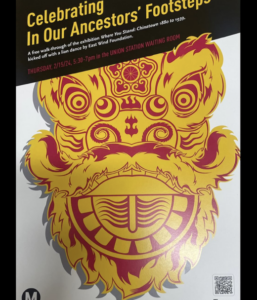 ICW and our partners gathered at Los Angeles Union Station for “Celebrating In Our Ancestors’ Footsteps,” a complement to the exhibition Where You Stand: Chinatown 1880 to 1939, currently on display in the Waiting Room Gallery. The event kicked off with an exciting roaming performance of a traditional lion dance by local East Wind Foundation students and continued with an exhibition walk-through.
ICW and our partners gathered at Los Angeles Union Station for “Celebrating In Our Ancestors’ Footsteps,” a complement to the exhibition Where You Stand: Chinatown 1880 to 1939, currently on display in the Waiting Room Gallery. The event kicked off with an exciting roaming performance of a traditional lion dance by local East Wind Foundation students and continued with an exhibition walk-through.
Redemptive Dreams: A Celebration of Kevin Starr’s California
February 12, 2024
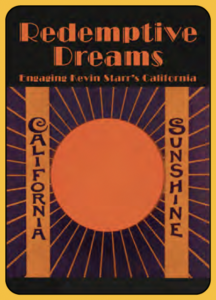 Kevin Starr (1940–2017) is rightly regarded as the dean of California historians. A fourth-generation Californian, the longtime state librarian and USC professor began publishing in 1973 a landmark series of volumes on the history of the Golden State. This event, held in conjunction with the release of Redemptive Dreams: Engaging Kevin Starr’s California, featured contributors to the book as well as academics whose careers have benefitted from Starr’s research and mentorship.
Kevin Starr (1940–2017) is rightly regarded as the dean of California historians. A fourth-generation Californian, the longtime state librarian and USC professor began publishing in 1973 a landmark series of volumes on the history of the Golden State. This event, held in conjunction with the release of Redemptive Dreams: Engaging Kevin Starr’s California, featured contributors to the book as well as academics whose careers have benefitted from Starr’s research and mentorship.
-
WELCOME
William Deverell, USC Divisional Dean for the Social Sciences and Co-Director, Huntington-USC Institute on California & the West
INTRODUCTION
Christian Grose, USC Schwarzenegger Institute
SPEAKERS
Jason Sexton, UCLA Institute of the Environment and Sustainability
Cid Martinez, University of San Diego
Megan Kendrick, Pepperdine University
Manuel Pastor, Distinguished Professor of Sociology and American Studies & Ethnicity and Turpanjian Chair in Civil Society and Social Change
Karin Huebner, USC Sidney Harman Academy for Polymathic Study
Brie Loskota, Former Director, USC Center for Religion and Civic Culture
Julia Wick, Los Angeles Times